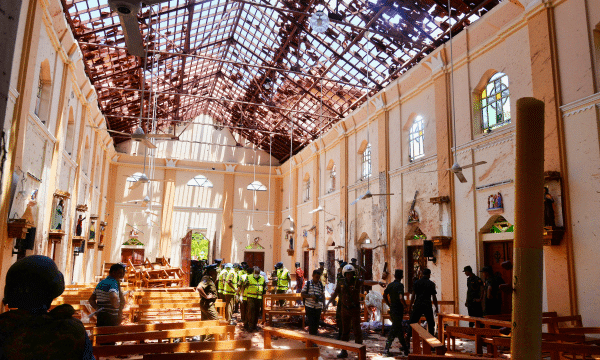
COLOMBO (UCAN): Sri Lanka’s president, Maithripala Sirisena, appointed a new five-member commission, headed by an Appeals Court judge, on September 21 to investigate and expedite action over the Easter Sunday suicide bombings that shook the country on April 21. This comes just ahead of presidential elections scheduled for November 16.
The new probe comes after continued demands by the Catholic Bishops’ Conference of Sri Lanka and Malcolm Cardinal Ranjith of Colombo, for a new independent commission that could make overdue progress. The bishops urged the government to treat their demand with the utmost urgency.
The committee is to carry out an impartial and complete investigation and identify the individuals or organisations directly or indirectly connected to the Easter Sunday atrocities.
The seven coordinated suicide attacks were perpetrated at three churches, three luxury hotels and a housing complex, killing 259 people, including 37 foreign nationals.
The committee has also been tasked with identifying police officers and officials who failed to adequately perform their duties.
Sirisena said a large number of complaints and allegations had been filed against public servants who had been accused of having direct or indirect connections with causing the loss of life, hundreds of wounded and widespread damage to property.
“It is in the best interests of public security and welfare to conduct investigations and inquiries into such complaints, allegations and information, in order to ascertain what measures should be made to provide far and ensure that the law is appropriately enforced,” he said.
One of the main allegations is that police and security forces failed to act on intelligence reports to protect churches.
Following the attacks, defense secretary, Hemasiri Fernando, resigned and police chief, Pujitha Jayasundara, was suspended.
“There will be no recurrence of such alleged acts and or omissions, negligence or failure to perform duties amounting to offences and abuse or misuse of power or authority,” Sirisena said.
The president requested an interim report within three months and a final report within six months. The latter must include its findings and recommendations.
The Sri Lankan Church said that if intelligence information had been properly disseminated before the attacks, Church officials could have cancelled the ill-fated Easter Sunday services.
Cardinal Ranjith said he no longer had faith that justice would prevail over the Easter Sunday victims despite repeated requests to reveal the truth behind the attacks.
Nevertheless, he would not give up his efforts to see justice handed out to those who massacred Christians as they prayed.
A parliamentary select committee was also appointed to record statements related to the bomb attacks and it will submit its report next month.
More than 170 suspects have been detained and questioned while a further 115 remain in custody.
Manuel Fernando, who escaped from one of the three churches, targeted, Katuwapitiya St. Sebastian, said he and his fellow parishioners had little faith any progress would be made in the inquiry during the run-up to the presidential election.
“Again an independent commission. How independent can they be? What happened to the earlier committee report?” he asked.









